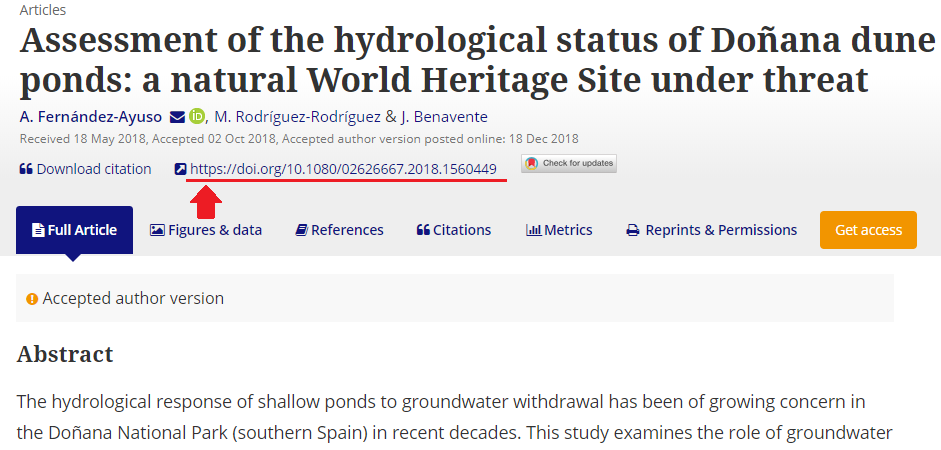What is Doi in Citation: Essential Guide for Researchers
A DOI, or Digital Object Identifier, is a unique identifier for digital documents. It helps locate and access academic papers and research easily.
In the world of academic writing, citations are crucial. They give credit to original authors and help readers find sources. The DOI plays a key role in this process. It ensures that references remain accurate over time. Unlike URLs, which can change, a DOI is permanent.
This permanence makes it a reliable tool for scholars. Understanding DOIs can enhance your research and writing. They bring stability and precision to your citations. In this post, we’ll explore how DOIs work and their importance in academic citations.

Credit: www.scribbr.com
History Of Doi
The DOI system started in 2000. It was created to help researchers. Before DOI, finding research papers was hard. Each paper had a unique DOI number. This made searches easier. Researchers could find and share information quickly.
Over time, the DOI system grew. More publishers started using it. Many fields adopted DOI for their papers. It became a global standard. The system improved access to knowledge. Today, millions of papers have DOI numbers.
How Doi Works
A DOI stands for Digital Object Identifier. It is a unique code. This code helps identify content like articles or books. A DOI is a combination of numbers and letters. It looks like this: 10.1000/xyz123. The first part, 10.1000, is the prefix. The second part, xyz123, is the suffix. Together, they create the full DOI.
To get a DOI, you must go through a registration process. First, you need to contact a registration agency. They are in charge of assigning DOIs. You submit your content to them. They review and check the content. If everything is fine, they give you a DOI. This makes your work easy to find. It also makes it easy to cite.
Benefits Of Using Doi
DOI helps in finding research papers easily. It makes search engines find papers faster. Researchers can locate the work with a simple search. Libraries also find it useful. They can track and manage papers better. DOI improves visibility of research. This means more people read and cite it. Authors get more recognition for their work.
DOI provides permanent access to research papers. Links to papers do not break. Even if the website changes, the DOI link stays the same. This ensures readers always find the paper. It saves time for researchers. They do not have to search again. DOI also helps in archiving papers. This keeps research safe for future use.

Credit: owl.purdue.edu
Doi In Academic Research
DOI stands for Digital Object Identifier. It helps find documents online.
DOIs give a unique number to each paper. This makes it easy to find and cite.
Many research papers use DOIs now. This helps keep track of sources.
Journals add DOIs to their articles. This makes them easy to search.
Researchers rely on DOIs to find trusted sources. Many journals require DOIs.
This ensures consistency. It also helps in proper citation.
Doi Vs. Other Identifiers
The DOI stands for Digital Object Identifier. It helps to find digital content. The ISBN stands for International Standard Book Number. It is used for books. DOIs are for articles, papers, and digital objects. ISBNs are only for books. DOIs are more flexible. They can be used for various formats. ISBNs are limited to physical and e-books. DOIs help in tracking updates and changes. ISBNs do not offer this feature.
The ISSN stands for International Standard Serial Number. It is used for journals and magazines. DOIs can be used for individual articles. ISSNs cover the whole journal or magazine. DOIs are more specific. They help find the exact article. ISSNs are broader. They only identify the journal or series. DOIs are useful for online content. ISSNs are mostly for print and online journals. Both are important but serve different needs.
Challenges And Limitations
Implementing DOI in citations can be costly. Small publishers and researchers may find it hard to afford. Fees for registration and maintenance add up. Sometimes, these costs can be prohibitive. Funding agencies may not cover these expenses. This creates a barrier for some researchers.
Technical problems can arise with DOI systems. Systems may experience downtime. This makes DOIs temporarily inaccessible. Incorrectly assigned DOIs cause confusion. Updating DOI information can be complex. Technical expertise is needed to manage DOIs. Not all researchers have this expertise.
Future Of Doi
DOI technology is always changing. New tools make it easier to use. Digital libraries grow every day. They store more research. This makes DOI more important. Blockchain might be used soon. It can make DOIs safer. Artificial Intelligence is also helping. It can find the right DOIs fast. This saves time for researchers. Technology will keep helping DOIs.
DOIs are now used around the world. Many countries see their value. They help track and cite research. This is important for all fields. More universities are using them. They make sharing research easy. Companies also see the benefit. They use DOIs for their reports. DOIs are becoming a global standard. This trend will continue to grow.

Credit: blog.wordvice.com
Practical Tips For Researchers
DOIs are unique. They help find specific articles easily. Use online databases. Look at the article’s first page. Check the last page too. Sometimes DOIs are in footnotes. Use DOI lookup tools. They are free and easy. Libraries can help find DOIs. Ask your librarian. Always double-check the DOI. Ensure it’s correct.
Always include DOIs in citations. Place them at the end. Use the format: “https://doi.org/”. It makes finding the article easy. Readers appreciate it. It shows professionalism. Many style guides require DOIs. APA and MLA include them. Ensure the DOI is correct. Double-check it. Typing errors can mislead.
Frequently Asked Questions
What Is A Doi In Citation?
A DOI is a unique identifier for digital documents. It helps in locating and referencing articles.
Why Is A Doi Important In Citations?
A DOI ensures the reliability and ease of access to the referenced document. It is a permanent link.
How Do I Find The Doi Of An Article?
Usually, the DOI is found on the first page of the article. It is often near the title or in the footer.
Can I Cite A Source Without A Doi?
Yes, you can. Use other details like the URL, title, and author information to cite the source.
Conclusion
Understanding the role of DOI in citations is crucial for accurate referencing. It ensures your sources are easily accessible. This small step enhances the credibility of your work. Remember, using DOI saves time and avoids errors. It simplifies the research process for everyone.
So, incorporate DOI in your citations. Your readers and future researchers will appreciate this. Happy citing!






